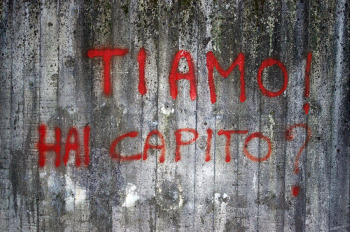
I love you, don't you get it?
Back in January of this year, I was asked by my Italophile friend Melanie of the Italofile blog (you may remember that I interviewed Melanie last year) to contribute a guest post to her “Five Favorites” series. I chose to write about five of my favorite Italian words, and as it turns out that’s been a rather popular post on Melanie’s blog! It’s been such a hit, in fact, that Melanie introduced a sequel – and has invited all the Italophile bloggers out there to contribute their own five favorite Italian words.
Now, Melanie said that since I started this whole thing I didn’t have to participate with a new post – but who can resist? A quick scan through the comments on the post Melanie wrote announcing the new challenge shows you how much fun people are having with it, coming up with their own favorite Italian words and sharing why they love the words so much. I even participated with another guest blog post I did for Cherrye at My Bella Vita – but there are so many words I love in Italian, it’s actually not difficult for me to come up with another five for a post on my own site.
ciliegia
pronounced: cheel|YEH|jah
This word is included here because it felt to me, when I was first taking Italian classes, like an enormous victory when I finally learned to pronounce it – and then later, when I was teaching beginning Italian students, I loved seeing their faces light up when they’d mastered it. It’s really too bad it’s not a more useful word, after all that work. Ciliegia means “cherry” in Italian, so if you’re visiting the right parts of Italy in the spring you may find it’s a handy word to know – and it also turns up now and then in gelato shops, although the most common cherry-related gelato flavor is amarena (sour cherries and their lovely sauce in a cream base).
insegnano
pronounced: een|SEHN|yah|noh
Here’s another word that’s a throw-back to my teaching days. The verb insegnare means “to teach,” and the third person plural form of the verb – “they teach” – is insegnano. This, in and of itself, is not terribly interesting. But when passing along pronunciation tips to my students, telling them that it sounded pretty much exactly like one might say, “He’s insane, y’know?” always got a giggle. Yeah, that’s me – one part teacher, one part stand-up comic. I’ll be here all week.
zenzero
pronounced: ZEN|zeh|roh
This is the Italian word for “ginger” – the spice, not a redhead – and this falls into the category of me liking it because of the way it feels to say it. It’s all the Zs – sort of like why I love saying the Italian word for mosquito, zanzara, even if I hate mosquitoes. I happen to really love ginger as a spice and flavor, so in this case I like both saying the word and what the word means.
assolutamente
pronounced: ass|ohl|oo|tah|MEHN|teh
With this word we’re back to teaching again, although this time it’s the teaching experience of a good friend of mine. When she told her students, who were struggling with the pronunciation of assolutamente (Italian for “absolutely”), that with this word they were essentially granted permission to say “asshole,” you can probably imagine how often they managed to work “absolutely” into their sentences from there on out.
bis
pronounced: BEECE
This word may not look Italian, what with its consonant at the end, and that’s because it’s not. It’s an old word, and a good one. The word bis (which can mean “encore,” or “twice,” or “seconds”) comes from Latin, and it may even come from Etruscan before that. The Italians use it when they’re asking for a second helping of food or wine, or when they’re applauding a musical act to play one more song. But perhaps the usage of bis that I love most is reserved for what we’d call “great-grandparents” or even “great-great-grandparents.” In Italy, your great-grandmother is your bisnonna – essentially your second grandma. Great-grandpa is bisnonno. And that great-great-grandparent who’s still pinching your cheeks? That’d be your bisbisnonna or bisbisnonno. I can’t tell you how that warms my heart. Plus, it’s kind of convenient to end on a word that means “encore,” now that I’ve participated in this five favorite Italian words thing three times…
Part of Melanie’s game is that anyone who participates is to select other Italophiles to submit their favorite Italian words. Many of the people I would ordinarily choose have already participated, but there are so many great Italy bloggers out there I’m hoping these people will be interested in sharing their favorite words with us.
And of course for me, this list now means I’ve talked about a grand total of 15 of my favorite Italian words, including the original post on Melanie’s blog and the second guest post I did for Cherrye’s blog. Still, there are many more words I love in the Italian language, and I’m sure I missed at least one you love. What are your favorite Italian words? Leave them in the comments section below.